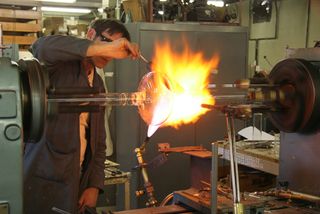How being transparent can help you succeed
Margaux Doey explains how you can become fairer and more ethical without losing customers or profit.
In an ideal world we'd all like to make a healthy living from creating fairly traded, ethical products. Sadly many are put off creating responsibly, because of cost. After all, it costs more to make the items, which means a heftier price tag for customers, in turn resulting in less custom. Right? Wrong says entrepreneur, technologist and founder of Provenance, Jessi Baker.
There is a whole world of people out there concerned with the social impact of material goods. In fact 30 per cent of UK consumers are concerned about issues regarding the origin of products. But few know how to really support those working towards a fairer trading world. That figure is nothing to be sniffed at, and if buying trends are anything to go by, then tapping into this growing market is going to be a super wise investment.
Provenance is working to help make ethical products more accessible and appealing and believes it all starts with being transparent about your operations. Launched just last month, the project uses real-time data technology to present the stories of products, in order to enable conscious consumption and improve transparency in supply chains.
It's ultimately a network of makers and designers showing their processes and celebrating craftsmanship. Founded to improve the relationships we have with products through transparency and authenticity, the project has already been listed in the Daily Telegraph's top 10 amazing science and technology innovations of 2014.
Now then, here's how it impacts you as the product creators...
Why do I have to be so conscious and open about my supply chains?
30-year-old Baker is a big fan of Leonardo Bonanni's approach to product manufacturing. The founder and CEO of the supply chain transparency website, Sourcemap, Bonanni says, "Without understanding the impacts of goods and services, we buy into systems that deplete natural resources, worsen environmental and social problems and endanger humans and ecosystems. Supply chains are conventionally held secret, limiting the stakeholders who can prevent environmental, social and health and safety problems."

It's now becoming increasingly important that competition is based on open knowledge, rather than just brand and price. And the only way this can be achieved is through a more open system of information flow within supply chain networks. This key factor will empower a new era of more conscientious consumers.
Get the Creative Bloq Newsletter
Daily design news, reviews, how-tos and more, as picked by the editors.
How are consumer trends changing?
We already know that in the UK, 30 per cent of consumers are concerned about issues regarding the origin of products, yet they struggle to act on this with their purchasing decisions. This is a problem of transparency, and information flow, not interest or appetite from consumers to buy more consciously.

Research from The Boston Consulting Group and Information Resources Inc. analysing nearly all retail chains in the U.S. found that 'responsible consumption' products accounted for 15 per cent of all sales. It also saw that sales had grown about 9 per cent annually in the past three years – making up 70 per cent of total growth. These kinds of figures can't be ignored.
Can I become fairer and more transparent without losing custom?
The simple answer is yes. Provenance's game changing technology allows businesses to make their supply chain transparent without the need to reveal identifying information to organisations further down the chain. You can guarantee the things that matter without disclosing your suppliers and any advantages or competitive edge you may have.

But here's the really interesting bit... "We know that among mid-level purchases, an increase of 20 per cent to the price of a product doesn't impact someone's intention to buy it, if they are sold as organic, ethical or sustainable," says Baker. "For high-value goods, in particular in the case of diamonds, people want a guarantee that the articles they're buying are genuine and responsibly sourced."
How will I benefit from making my supply chains fairer?
Research has proven that products with a positive but genuine story fetch a higher price. Like brand stories, Provenance data gives products a premium. "We want makers and designers to compete on process, not price," says Baker. "Customer focus is now on authenticity and transparency."
On a micro-level, small, local businesses, their employees and the retailers that sell their products will be the main benefactor in economic terms. Communities where these businesses are based will also see knock on social impact of that success. And as these company's grow, the benefits will increase.

Central to the Provenance mission is the connection it's establishing between makers and shoppers. By opening up the communication channel, it's enabling shoppers to explore product data they can trust. They're also empowered to ask questions and make informed choices. And shoppers value honesty, so being more transparent with your operating systems, will encourage a more loyal customer base.
How Provenance is helping product creators
Jessi and her team know there is environmental and social damage occurring during the creation of many products, and this is masked with fictitious branding campaigns. Yet the things we buy determines which companies grow and survive above others. But it's currently really difficult to make a positive choice... We know little about how the things we invest our money in are created, so we're constantly having to question what is authentic and what isn't.

"Provenance exists to change this," Baker shares, "to make it easier to access that information. And we're doing that by starting with the most pioneering companies. These happen to be designers and makers for whom process is part of the value of the product they create. It makes sense for them to share that information and by sharing it in an inspiring way, we hope to enable consumers to seek out similar stories about all the products they buy."
Three easy steps to becoming a more responsible creator
- Get real – Share images of your processes, team and genuine work through your social channels. Help customers find out about your company through the things you do, rather than the things you say.
- Tell a story – There's no use just dumping your processes onto a website and expecting people to care. Crafting your true story into a format that people will read and share is essential.
- Don't expect to do it alone – Makers are busy. So lean on the people you serve and the people who serve you (your suppliers) to bring your authentic story to life!
The success stories
Everlane, Patagonia, many Etsy makers and luxury brands such as Hermes all do this very well. However there are also vital innovations in businesses like the fish supplier John West, which has started including codes on tuna cans to enable backtracking to the fisherman. If you want proof of how this can impact the bottom line, you could take note of the £17m boost it added to the brand's sales.
Words: Margaux Doey
Margaux Doey is a freelance journalist, blogger and winner of the PPA Magazine Academy's New Digital Product Concept 2013. Follow her on Twitter and read her blog on Outdoor Chics.
Like this? Read these...
- The designer's guide to working from home
- Free graphic design software available to you right now!
- Illustrator tutorials: amazing ideas to try today!

Thank you for reading 5 articles this month* Join now for unlimited access
Enjoy your first month for just £1 / $1 / €1
*Read 5 free articles per month without a subscription

Join now for unlimited access
Try first month for just £1 / $1 / €1
The Creative Bloq team is made up of a group of design fans, and has changed and evolved since Creative Bloq began back in 2012. The current website team consists of eight full-time members of staff: Editor Georgia Coggan, Deputy Editor Rosie Hilder, Ecommerce Editor Beren Neale, Senior News Editor Daniel Piper, Editor, Digital Art and 3D Ian Dean, Tech Reviews Editor Erlingur Einarsson and Ecommerce Writer Beth Nicholls and Staff Writer Natalie Fear, as well as a roster of freelancers from around the world. The 3D World and ImagineFX magazine teams also pitch in, ensuring that content from 3D World and ImagineFX is represented on Creative Bloq.
